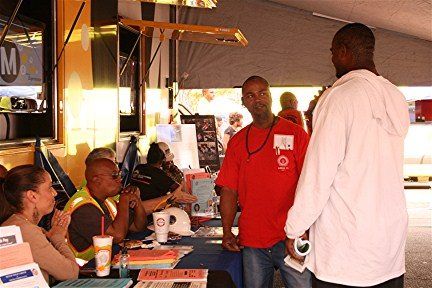

The annual Taste of Soul Festival is renowned for its culinary offerings and cultural richness. This year’s festival, however, had something else on the menu: real hope for job seekers.
The promise of employment comes from the groundbreaking Construction Careers policy passed by the Metropolitan Transit Authority (MTA). Metro became the first transit agency in the country to ensure that projects are completed using skilled workers and creating training opportunities for economically disadvantaged residents. Since then, the Construction Careers coalition – an alliance of worksource centers, youth-engagement and veterans groups, and community groups – has embarked on an ambitious effort to reach out to as many communities as possible about opportunities in the construction industry, in advance of groundbreaking on major projects that will be covered by the policy, including the Crenshaw/LAX line, the Westside Subway Extension and the Regional Connector. This sort of outreach is crucial as South L.A. is one of the communities hardest hit by unemployment.
» Read more about: A Taste of Soul With a Side of Construction Careers »
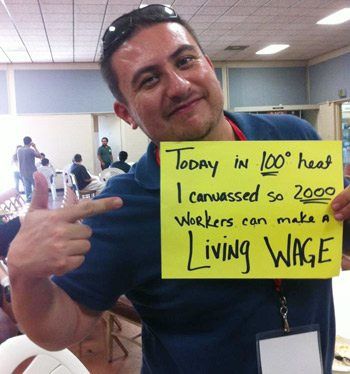
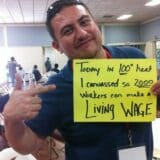
Long Beach hotel workers and community activists made history Tuesday, passing a living wage ballot measure that will help lift 2,000 people in that city’s tourism industry out of poverty.
Long Beach was one of three cities nationwide that passed minimum wage measures (San Jose and Albuquerque were the others), and the only one that enacted a law with paid sick leave. Workers at Long Beach’s large hotels will now earn at least $13 per hour and will have five paid sick days a year.
The passage of Measure N is the culmination of a multi-year effort by LAANE, UNITE HERE! (the union representing tourism industry workers) and the Long Beach Coalition for Good Jobs and a Healthy Community to build grassroots power in Long Beach, a city that for decades has been dominated by business interests largely disinterested in the huge numbers of working poor. Beginning with a large-scale civic engagement project,
» Read more about: Election 2012: Huge Election Win for Long Beach Hotel Workers »


It seems like a hopeless conundrum. We need our government – federal state and local – to stimulate the economy and help create jobs. But our government has no money. Or at least less money. So does that mean that it’s foolish – or unfair – to insist that our local, state and governments do “something” to create more and better jobs for people who desperately need them?
Well, no. In fact, there is a lot that our government can do to double or triple the number of jobs that are being created in the U.S. with the same or similar amounts of money. We just have to do things in a smarter and more strategic way to get much better results.
Here’s what I mean. As people may imagine, local, state and the federal governments buy billions of dollars worth of goods and services every year. Think about all of the buses,
» Read more about: Winning More Jobs from Government Investment »


Suppose the growth of the U.S. economy slows to a trickle. I don’t mean in the next quarter or next year or even over the next decade. I mean from this time forth.
That’s the prediction of Northwestern University economist Robert Gordon in a new paper that’s become the subject of widespread commentary.
Gordon writes that three industrial revolutions have taken place over the past 250 years: the first centered on the steam engine and railroads; the second based on electric power, the internal combustion engine and indoor plumbing; and the third rooted in computers and the Internet. By substituting mechanical power for human power in the production process and by greatly speeding up transportation and communication, Gordon asserts, the second revolution raised productivity and wealth far more than did the other two.
Indeed, U.S. productivity gains and the concomitant increase in wealth have slowed in recent decades from the levels the United States historically enjoyed.
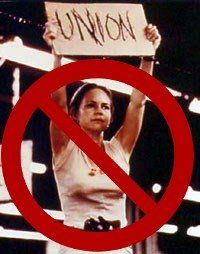

In 1978, California voters passed Proposition 13 – a ballot initiative that rolled back property taxes to 1975 levels and capped future increases at two percent. More destructively, it mandated that all future tax raises in the state be approved by the legislature by a two-thirds margin. The law presaged a wave of anti-taxation measures across the country that continues to define the political landscape we inhabit to this day. Ironically, while Prop. 13 was an effective carrier of the anti-taxation message, the rest of America soundly rejected the draconian policies Prop. 13 put into place to block the raising of tax revenues.
“The specifics of Prop. 13 were largely not adopted in other states,” explains Lenny Goldberg, Executive Director of the California Tax Reform Association. “Hardly any states enacted the two-thirds majority rule. And very few states treat taxes on commercial properties like Prop. 13 does.
» Read more about: After Election Day: Two, Three, Many Prop. 32s »


(This opinion piece first appeared in today’s Los Angeles Times.)
The U.S. economy has turned a corner. The national unemployment rate hit a post-recession low of 7.8 percent in September. Rising consumer confidence, increasing home prices and other leading economic indicators confirm the trend.
Unemployment is still too high, but a focus on the number of jobs obscures a serious long-term crisis of declining wages and a shrinking middle class that is having a harder and harder time making ends meet. New jobs pay less, raises are rare and benefits even rarer. According to a National Employment Law Project study released in August, the majority of new jobs created in the last two years pay just $13.83 an hour or less. Nobel laureate economist Joseph Stiglitz recently said, “Increasing inequality means a weaker economy” for all of us.
» Read more about: Raising the Minimum Wage Is the Least We Can Do »
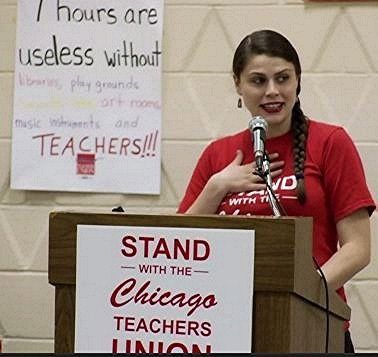
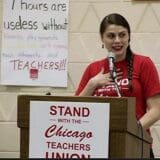
In September, 25,000 Members of the Chicago Teachers Union (CTU) stood strong on picket lines and flooded the streets of downtown Chicago in rallies, refusing to return to work until the school district and Mayor Rahm Emanuel came closer to their idea of fair in contract negotiations.
They prevailed. The teachers defeated merit pay, forced the district to hire 600 teachers and took care of laid-off workers. In doing so, they showed that teachers’ unions will not lie down, even as privatization encroaches. The teachers and unions also experienced an outpouring of support from activists and the general public.
How did CTU pull it off? What lessons are there to learn from the victory in Chicago?
A recent forum asked how CTU transformed its union in order to draw lessons for the future from the successful campaign. The forum was documented on video (posted above). Featured speakers are:
» Read more about: Chicago Teachers: How We Won Our Strike »


Wells Fargo Bank and US Bank have chosen to celebrate Breast Cancer Awareness Month by trying to evict breast cancer survivors from their homes.
Last week, Ana Casas Wilson — a wheelchair-bound woman with cerebral palsy and terminal stage-four breast cancer, and who has struggled for months to get Wells Fargo and US Bank to accept her money and stop foreclosing on her home of 40 years — received a final five-day notice to vacate from L.A. County Sheriff Lee Baca’s office. Wilson and her family briefly fell behind on her payments after she had to go into the hospital for a double mastectomy, as I described in an earlier post. She and her friends and supporters have launched a round-the-clock vigil at her home in a blue-collar suburb outside Los Angeles (8968 San Juan Ave., South Gate, CA 90280) to resist eviction, as the Los Angeles Times reported last week.
» Read more about: Foreclosures: Stop Cancer Survivor's Eviction! »


“Kick the can down the road” may be a politician’s mantra, but it’s certainly not what some Native Americans meant when they spoke of the Seventh Generation. The Iroquois thought that decision-making ought to consider the impact on children yet to come. Politicians, on the other hand, pick the least painful path now and let someone else deal with the consequences 30 years from now.
The Los Angeles City Council just kicked the can. Its members, at the urging of the Mayor, voted almost unanimously to change the pension program for new civilian city employees. This policy change only applies to new hires and exempts police, firefighters and the employees of the Department of Water and Power. The plan reduces new workers’ pensions by two-thirds, eliminates health-care support for their spouses and decreases take-home pay during years when the stock market isn’t performing well enough to sustain retirement investments.
» Read more about: Pensions: City Kicks a Can Down the Road »
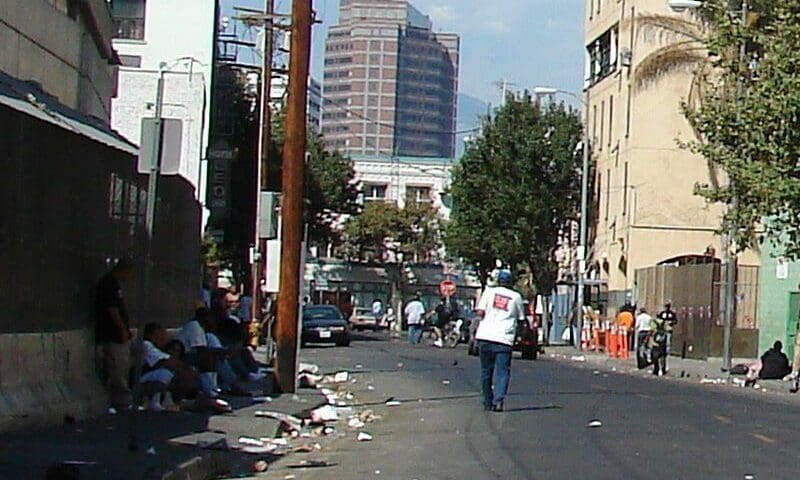

A recent story in The New York Times, back in its business section, had important news about inequality: “Income Inequality May Take Toll on Growth.” A couple of economists at the IMF reported research (here) showing that, across many countries, periods of greater income inequality tend to be followed by slow-downs in economic growth.
This is, actually, old news. About 20 years ago the research literature already showed that inequality probably damped the economy (see pp. 126ff here). But this remains important to repeat – not just because reporting the baleful effects of inequality now has the imprimatur of the IMF, but also because so many people still resist the news; they insist instead on believing the opposite, that inequality stimulates the economy, to the benefit of everyone. And, of course, this insistence has political implications right now.
» Read more about: Growth Is the Price of Income Inequality »
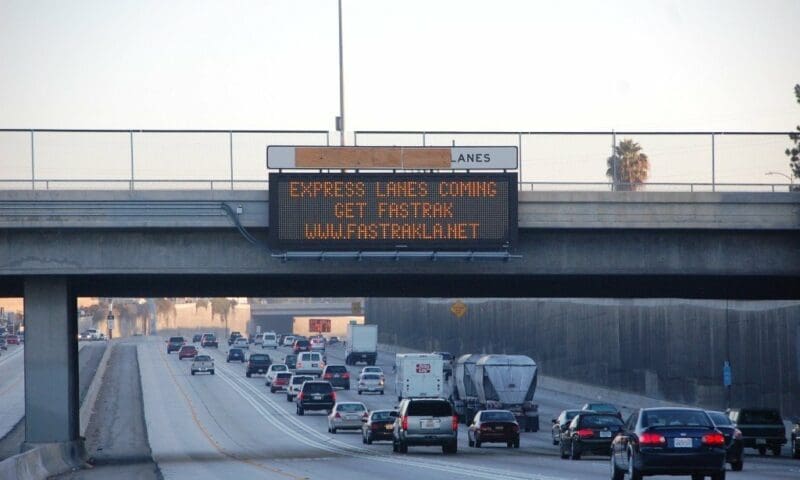
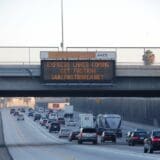
Starting on November 10, Los Angeles will begin a one-year experiment to convert High Occupancy Vehicle (HOV) lanes, better known as carpool lanes, to High Occupancy Toll (HOT) lanes on two major freeways. Toll lanes are not new to California drivers, but this is the first time we will see these lanes on L.A.’s busiest freeways.
The HOT lanes will allow lone drivers to access the current carpool lanes on the I-10 (beginning early 2013) and I-110 (November 10) freeways by paying a toll that changes based on the current level of traffic. Drivers who utilize carpools, van pools, buses and motorcycles will continue to access those lanes for free. (For more information on all the rules and details, check out Metro’s handy-dandy FAQ page.)
Metro argues that HOT lanes will reduce congestion in the regular lanes, and that all revenue from freeway tolls will go directly to fund improvements to public transportation and roads near the freeways where tolls are collected.
» Read more about: HOT Lanes Are Heating Up in Los Angeles »
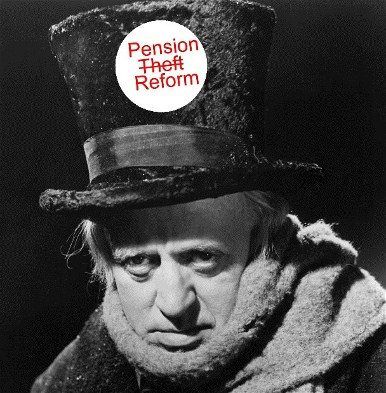

Former Los Angeles Mayor Richard Riordan is pushing a ballot initiative that would decimate city workers’ pensions and replace them with risky 401(k) plans.
Riordan is aiming more at voters’ emotions than he is at solving a budget issue. It won’t solve the city’s budget problems. If Riordan’s initiative gets on the ballot, it will only make things worse.
I’ve worked as a tree trimmer for the City of L.A. for 15 years. When thinking about Riordan’s plan, I want people in L.A. to ask themselves these questions: How is the pension I earn during my years with the city going to take food off your table or take money out of your pocket? How is my pension going to keep you from finding work or paying your rent and bills?
The answer is simple: My pension does not hurt your quality of life.
So, what’s the motivation for Riordan’s attack on retirement?


These pages are filled with stories of bad corporate actors — companies that attempt to boost profits by cutting labor costs at the expense of safe and ethical work environments. It’s a pleasure, then, to report on a multinational company’s CEO who is trying to make a difference.
Karl-Johan Persson, the CEO of H&M, recently traveled to Bangladesh, a country from which the fashion giant sources tons of textiles, to meet with Prime Minister Sheik Hasina and ask that textile workers be paid a fair wage.
The visit was pure activism as H&M does not actually own any Bangladeshi factories, it simply sources from the country. The argument Persson used with the PM is strikingly similar to that used by U.S. living wage advocates: A higher wage will be good for the country, not just workers.
Corporate Social Responsibility Newswire reports on the strategy behind the visit:
In addition to working with suppliers to increase wages,
» Read more about: A Responsible Persson: H&M's Boss Argues for Wage Hikes »


Two weeks out from the presidential election, you may not have the epic battle between L.A.’s Chinatown community and Walmart foremost in mind. But this high-stakes conflict is nothing if not riveting, with all the twists and turns of a modern-day Chandler novel.
If you haven’t been paying attention the last few months, here’s a quick cheat sheet: In February Frying Pan News broke the story that Walmart was planning to open its first-ever Los Angeles grocery store in historic Chinatown. The prospect of the world’s largest retailer setting up shop in a neighborhood famous for its homegrown stores and restaurants prompted residents, business owners and activists to seek a temporary ban on chain stores in the area. Just as the City Council was poised to pass the ban, Walmart mysteriously – some would say suspiciously, in the wake of the corporation’s stunning Mexican bribing scandal – secured building permits for its Chinatown location the night before the Council vote.
» Read more about: Walmart vs. Chinatown: The Suspense Builds »


Big Food companies and their lobbying groups have lied to us many times. They convinced Congress to include tomato paste on pizzas as a vegetable. They say we need industrial, chemical-laden agriculture to feed the world. (Check out Anna Lappé’s new video Food MythBusters to learn that we don’t.) And Big Food has also spread the mythology that if the minimum wage is raised, food will become so expensive that none of us will be able to afford to eat out – or eat at all – again.
Yes, that’s a lie! On this Food Day 2012, our organizations are releasing a new report, A Dime a Day: The Impact of the Miller/Harkin Minimum Wage Proposal on the Price of Food. The proposed Fair Minimum Wage Act, introduced this year by Representative George Miller (D-CA) in the House and Senator Tom Harkin (D-IA) in the Senate would raise the federal minimum wage from $7.25 to $9.80 per hour over the next three years and the tipped minimum wage from $2.13 to 70 percent of the regular minimum wage.
» Read more about: What Can You Get for a Dime a Day? A Lot, Actually »


I wrote this post for The Stansbury Forum, a site honoring the work and spirit of union activist, writer, friend and mentor Jeff Stansbury, who died in 2008.
Five years in Los Angeles and I was still suffering from the region’s alienating social atmosphere. I had a few good friends, a new relationship and some interesting work under my belt in sales, journalism and PR. But I couldn’t shake the sensation that people in L.A. keep their distance and that there was something innately “asocial” about this place.
As I’ve explained, the labor movement was the tonic for my personal crisis. Southern California’s sprawl, materialism and hyper-individualism became less of a preoccupation when I started working with unions. I was finally giving up my fantasy of heading back to Vermont and could concentrate my mind on universal themes: big stuff like ethnic and class roots,
» Read more about: Making History: Remembering Jeff Stansbury »


If you skipped down below, you saw that Joann is the Executive Director of the Food Chain Workers Alliance, a national coalition of workers’ organizations, and Jill is Director of Business and Culinary Development of Coosemans Shipping of L.A., a specialty produce distribution company. So, you may be wondering – what are these two doing writing a blog post together?
We are co-chairs of the Good Food Procurement working group of the Los Angeles Food Policy Council, an initiative of Mayor Antonio Villaraigosa. Over the past year and a half, our diverse group – including labor organizations, businesses, non-profit groups, school food service officials, public health advocates, and many more – has developed the Good Food Purchasing Pledge. And the L.A. City Council is poised to adopt the pledge via the Good Food Purchasing and Procurement Motion, sponsored by Councilmember Paul Koretz,
» Read more about: L.A. Is Leading the Good Food Movement! »
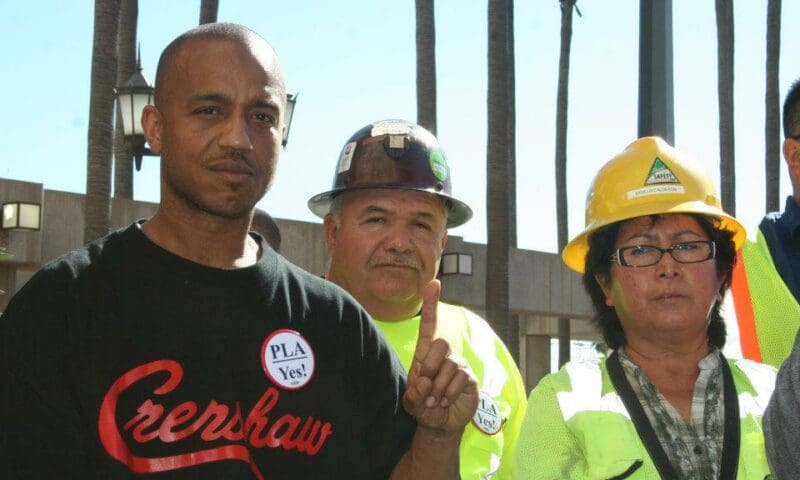
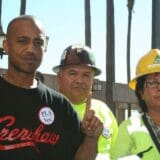
The U.S. Census reported in September that San Francisco and San Jose are the richest cities in the nation and that the poverty rate in California increased for the fifth year in a row, to 16 percent of the population. The Great Recession has been brutal for working people and clearly we aren’t out of the woods yet.
We need jobs. Good jobs. Here. Now. A lot of people in Los Angeles have been working on making that happen, especially around transit, and the efforts are starting to pay off. First, L.A. County voters approved the Measure R half-cent sales tax in 2008 that raises $40 billion for transportation – here, in L.A. County – over 30 years. Then, the Los Angeles Alliance for a New Economy (LAANE) and the L.A.-Orange Counties Building & Construction Trades Council convinced L.A. Metro to take the extra steps to make sure Measure R jobs are good jobs.
» Read more about: Good Jobs Here, Now — When & Where We Need Them Most »
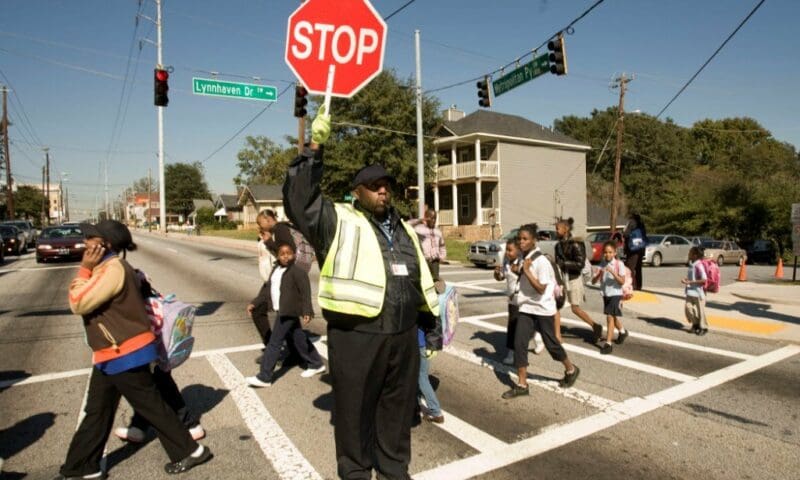
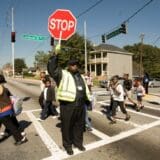
The next time a politician calls on the state or federal government to trim its workforce – right after promising to “grow jobs” – it might be good for him to remember that one in five working Americans is a public employee. Not only does thinning the public sector reduce the number of services and quality of life enjoyed by taxpayers, it also throws more people onto the unemployment rolls.
Those who see themselves as swashbuckling entrepeneurs or disciples of Ayn Rand do have an alternative to public sector employment in mind – the privatization of work that has historically been performed by government.
In the Public Interest, a nonprofit that researches the dynamics of privatization and government contracting, has just released a study showing in sharp relief the dangers that come with such an alternative. This backgrounder brief is titled, rather unambiguously, “Six Reasons Why Government Contracting Can Negatively Impact Quality Jobs and Why it Matters for Everyone.”
» Read more about: New Study: Keep Public Service Jobs Public »


In 1894, in Le Lys Rouge, Anatole France wrote, “The law, in its majestic equality, forbids the rich and the poor alike to sleep under bridges, to beg in the streets and to steal bread.”
Over time, this phrase, (probably along with “Let them eat cake”), has become the enduring expression of those things that sound like equality but, in ignoring differences in station, circumstance or means, become absurd, because, in reality, they would only be applied to one of the two groups allegedly being treated in equal fashion.
Such is the case with Prop. 32. This proposition would bar contributions of funds for “political purposes” (further defined below) only if those funds were collected through payroll deductions. The measure is crafted to look as though it is limiting the ability of both unions and corporations to make campaign contributions to candidates or measures, but, in truth,
» Read more about: The Fundamentals of a Fraud: Proposition 32 Explained »